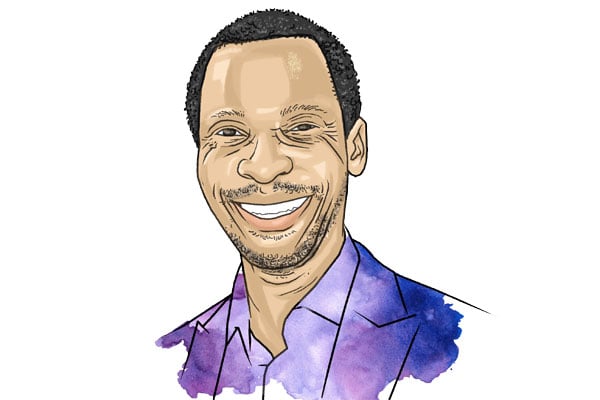Two youth reap from online innovation

Left to right: Niel Sangho (white shirt), Bonny Iga Madrawi during an interview at Outbox Hub, Kampala. Photo by Rachel Mabala
What you need to know:
- In 2011, oblivious of the market, the two young men set up an IT company in South Sudan, “Innovative Connections” amidst struggles of inadequate appreciation for IT businesses, language barrier and a high standard of living.
- Eronie Kamukama spoke to the founder and cofounder of Intership UG, a local online shopping site, they have built on how they make money.
Seated at innovation hub Outbox, 28-year-old Niel Sangho has a laptop, its accessories and a working table where the laptop sits. This is similar for his 29-year old coworker Iga Bonny.
As Mr Iga types away, one would misguidedly think the former accountant is on Facebook scrolling through profiles of old friends or checking the latest photos on Instagram like most Ugandan youth.
While I hold that thought, Mr Iga quickly explains that he is the cofounder of Intership UG, a local online shopping site, a platform he has built with Mr Sangho.
After his Computer Science degree in 2009, Mr Sangho worked with a number of IT (Information Technology) companies until he called it quits to become his own employer.
“I was the head of IT in an architectural company but after one and a half years, I quit to start this company with Bonny. This was because I saw no progress in my job yet there was an opportunity to start a company in South Sudan,” Mr Sangho narrates.
In 2011, oblivious of the market, the two young men set up an IT company in South Sudan, “Innovative Connections” amidst struggles of inadequate appreciation for IT businesses, language barrier and a high standard of living.
At the time, services ranged from recommendation of IT structures for organisations, procurement, installation, implementation, maintenance of systems to website design and IT training.
Shortly after designing websites for the Electoral Commission of South Sudan and Constitutional Review Commission, Mr Sangho closed shop due to the war and returned to Uganda in 2013.
Starting the idea
Once they settled in Uganda, procuring products for clients remained difficult as most of them were of poor quality. The process of importing equipment also became complicated.
Through a referral, a woman asked Mr Sangho to import a wedding gown and accessories a week to the D-day. They saw a window of opportunity to try an idea that this frustrated former systems manager had been hatching.
“We decided to try and see how it would work. We had no specific website so we used WhatsApp and made phone calls to friends. We shipped the goods on time through couriers,” Mr Sangho recounts.
This was a turning point as they decided to build a proper website to ease shopping and shipping of goods into Uganda.
To start Intership UG, Mr Iga says they invested savings worth Shs15m, most of which was spent on establishing a supply chain.
“We were lucky because it is a service company. We had the advantage of customers giving us money upfront on their orders. This, in a way, helped us to cover most of our costs,” Mr Iga says.
How Intership UG works
Once a client makes an order, Intership UG provides several product options from different counties so that a client chooses what suits them in terms of quality and cost.
The client also chooses the online platform to shop from such as Amazon or eBay before paying.
Mr Sangho explains: “When you agree, you have to pay us 70 per cent of the money so it covers the cost of buying the product.”
He says the goods are shipped to their warehouses in USA, China or United Kingdom. Every two weeks, all goods in the warehouses are shipped to Uganda but they plan to start delivering every week.
The 30 per cent is paid on delivery of goods along with the delivery fee, shipping charges, taxes and a commission to Intership UG.
With this system, clients are able to buy products from credible producers at cheaper prices compared to prices on the local market.
However, experienced online shoppers can buy their products and ship them to Intership UG’s warehouses until they are delivered to Uganda.
Local companies that struggle to import equipment are also able to have their goods shipped once a local purchase order has been approved.
Achievements
Mr Iga underscores the significance of emerging Uganda’s best business startup in 2015. This was during the annual Seedstars World startup competition that cast them into the limelight after winning nine groups of young entrepreneurs.
According to him, a trip to Switzerland where they met successful global investors and innovators was a game changer.
“The trip to the global competition was an eye-opener for us. We got exposure, created lasting networks, for example, we interacted with the regional head of eBay (shopping website) and got business training from experts in client acquisition, distribution, scaling up,” he explains.
He adds that the company earned more credibility that has grown their partnerships in countries such as United States of America, China and customer base has risen to 3,000 clients mostly referrals from the website’s users.
This has translated into profits that they have used to expand services in countries such as Rwanda, Kenya and South Sudan. He says their sales revenue is currently Shs35m per month.
Challenges
Mr Sangho agrees that their success is without challenges especially because clients were reluctant to trust services of a new company. But winning Seedstars competition was a stamp of approval. Confidence has been enhanced with delivering quality services that attract new clients.
He also says financial constraints are a challenge because the company needs cash at hand in order to deliver clients’ orders.
High taxes also remain a big hurdle. He says: “There is crazy taxation and Uganda is just not suitable for any startup. There is a struggle to stay compliant which sometimes kills young businesses.”
In addition, the lack of a culture among local investors to invest in budding innovations is limiting foreign investors from putting in their money.
Future prospects
According to Mr Sangho, ideally Intership UG should be able to expand into more major business areas such as Asia especially Dubai once they have established more connections.
They plan to streamline their businesses with better partnerships, distributors, shipping companies and grow internally to employ workers.
Mr Iga says they intend to enable local partners to export their goods to foreign markets.




